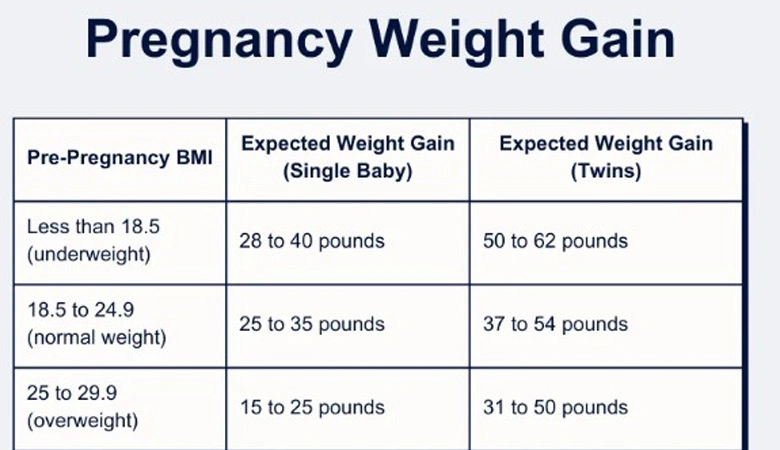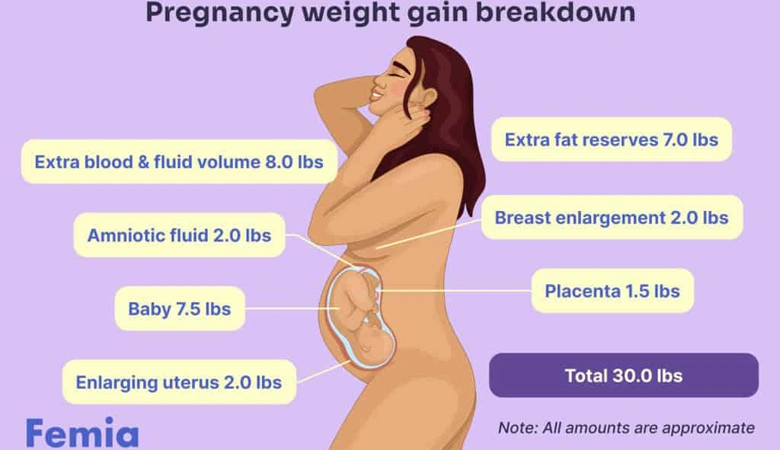Weight Gain in Pregnancy
- Pregnancy
-
- UPDATED DECEMBER 07, 2024

by Tasha Mayberry
650 shares
Right from the pure joy and excitement of knowing that there is a new life growing inside of you, to choosing your doctor/midwife, getting the nursery ready, nesting, and a whole lot more happening in your life, it is natural for you to forget about keeping track of your weight gain. But, you need to know that recording your weight gain during these months is way more important than you think because it concerns the health of you and your baby.
You need to make sure that your weight gain during pregnancy is neither too much nor too little. However, there are a lot of factors that influence your weight gain during this time, such as:
Your weight before pregnancy – if you are an underweight individual, you would be required to gain a little more weight than the norms; on the other hand, if you are overweight or obese, your doctor will ask you to watch your weight and not gain too much. Your growing baby.
Your placenta. The amniotic fluid. The number of babies you are carrying (twins, triplets, etc.). Fluid retention in your body. Your growing breasts and uterus. Increasing blood volume.
As a matter of fact, some pregnant women tend to lose a few kgs. during the first trimester, and this is widely common among those who experience morning sickness. Know that this is completely normal, but of course, you can talk to your doctor about it to gain some clarity.
Pregnancy Weight Gain Guidelines

While it is commonly said that weight gain of 10 to 15 kg is what you should aim at during
pregnancy, the range varies based on your Body Mass Index (BMI) before your conception.
Following are the gestational weight gain recommendations given by the American Institute
of Medicine (IOM):
Women who are underweight, with BMI less than 18.5 should gain around 13 to 18
kg.
Women who are of normal weight, with BMI between 18.5 and 24.9, the weight gain
should be around 11 to 16 kg.
Overweight women, with BMI between 25 and 29.9 should gain between 6.8 and 11.3
kg.
Obese women, with BMI 30 or more are recommended to keep their weight gain
between 5 and 9 kg.
Of course, it goes without saying that if you are carrying more than one baby, your pregnancy
weight gain should be higher, and the general recommendations from IOM for women
carrying twins are as follows:
Weight gain between 16.8 and 24.5 kg for normal weight women.
Weight gain from 14.1 to 22.7 kg for overweight women.
Weight gain from 11.3 to 19.1 kg for obese women.
Importance of Following Weight Gain Recommendations

Various studies and organizations have provided the above-mentioned weight gain
recommendations for pregnant women for a reason. If you tend to gain less than the
recommended amount of weight, there is a chance that you could deliver a small baby, and if
the baby is too small, he/she could face various illnesses, may not breastfeed, and might have
delays in reaching developmental milestones.
On the other hand, if you gain too much weight, you could deliver a large baby, and this can
cause complications during the delivery itself and the baby could be overweight or obese
right from childhood. Also, you could find it difficult to lose your pregnancy weight after
delivery, which again can lead to several complications.
Managing Pregnancy Weight Gain

Of course, you need some extra calories when your body is nourishing a child inside you, but that doesn’t necessarily mean that you need to “eat for two”. As a pregnant woman, you need only about 300 extra calories a day, which should also be healthy. While this will help you manage your weight gain during pregnancy and gain only the recommended amount, here are a few other tips on the same:
Talk to your healthcare provider right from the beginning about your recommended weight gain in pregnancy and work with a nutritionist if necessary to come up with a solid plan. Follow up on your weight gain journey regularly with your doctor and nutritionist. Have a balanced diet plan, which means your meals should include fruits, vegetables, whole grains, lean protein, and dairy. Take low fat and low-calorie foods wherever possible, like low-fat milk. Again, if you are not sure which foods to avoid during pregnancy, talk to your doctor or nutritionist.
Keep track of your pregnancy weight gain. Create a manual chart or use one of the many resources available online to regularly track your weight gain and compare the same with the recommended range.
Reduce your intake of sugar by limiting taking foods like desserts, soft drinks, fried foods, etc. Be physically active as much as you can. Depending on the stage of your pregnancy and your health condition, your doctor will be able to recommend a few physical activities that you can perform, like brisk walking, pregnancy yoga, etc.
Yes, you will crave different foods at different times, in which case you could give in once in a while, but not always. Just remember that following your pregnancy weight gain plan will help both you and your baby stay healthy before and after delivery.